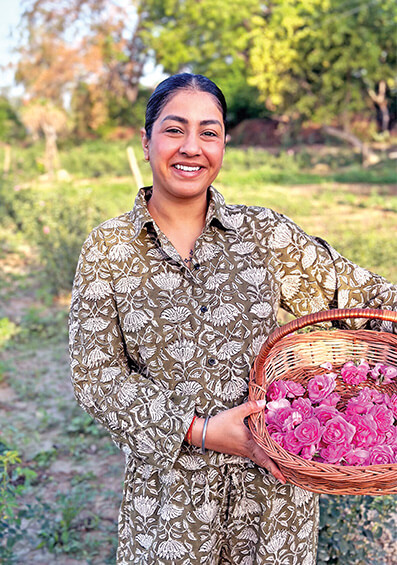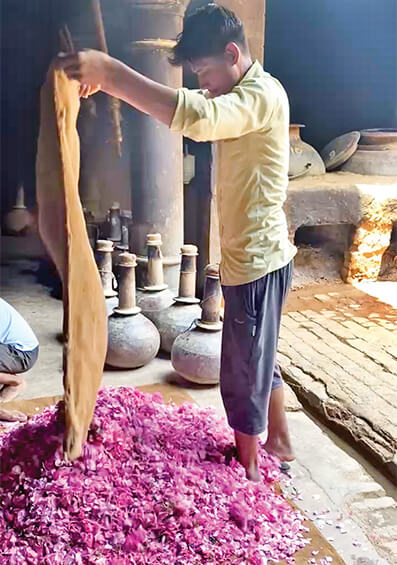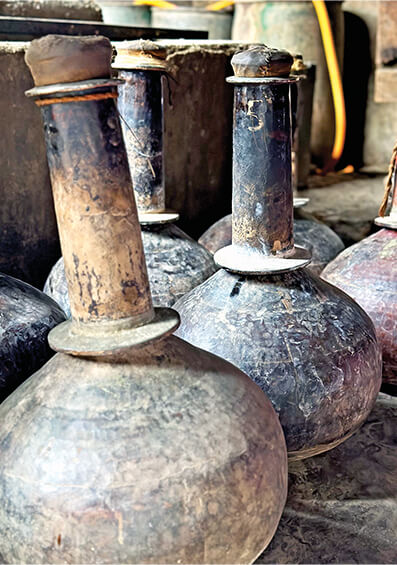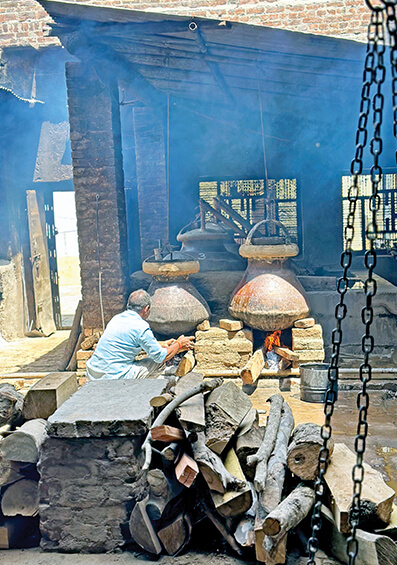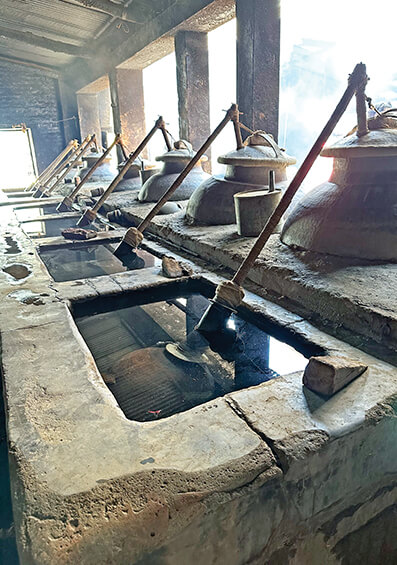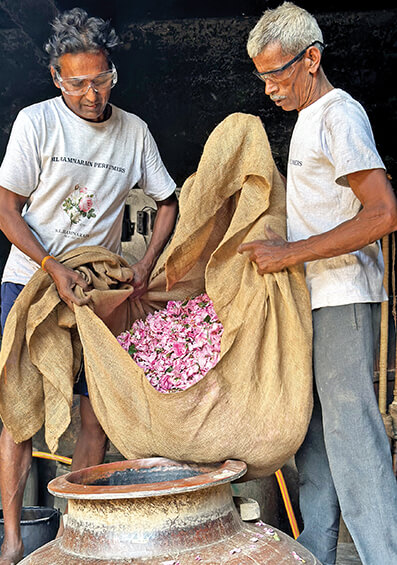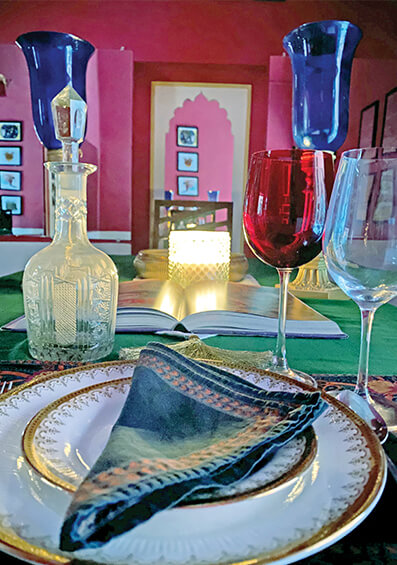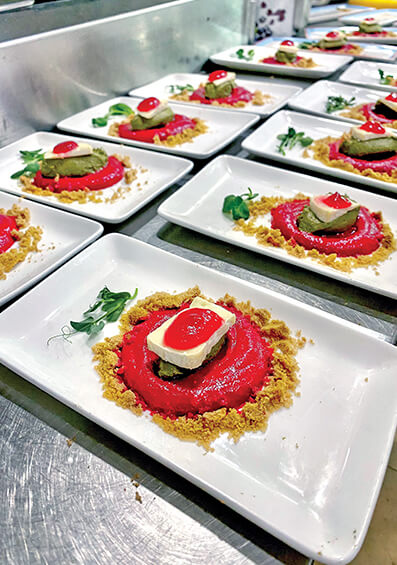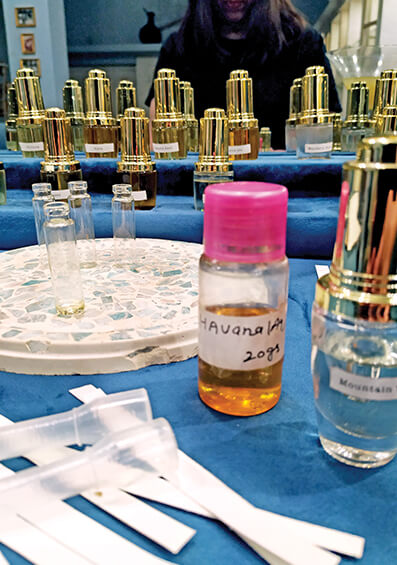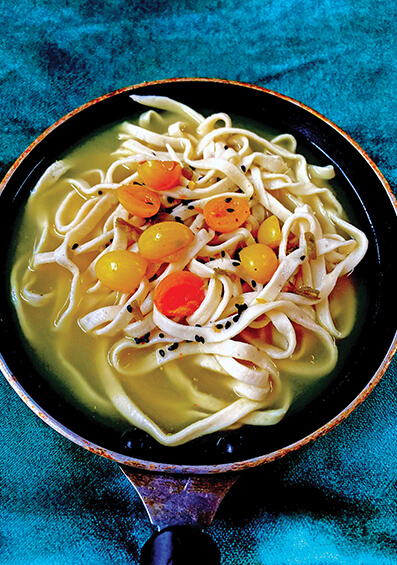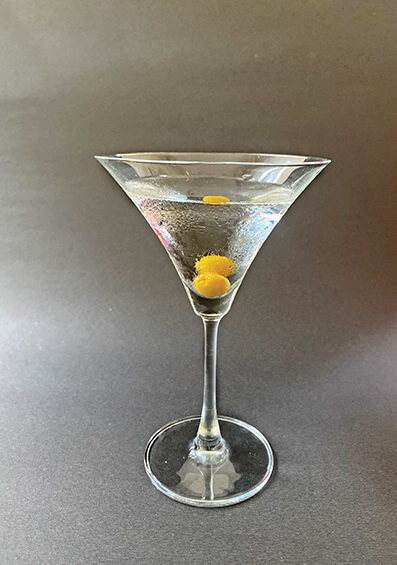Aromatic Foods
The Proof Lies in the Aroma
Olfaction plays an important and ancient role in gastronomy. Chef Pranav Kapoor elaborates in a symphony of scent and taste at his haveli in Kannauj
Text: Puneet Kaur Sidhu
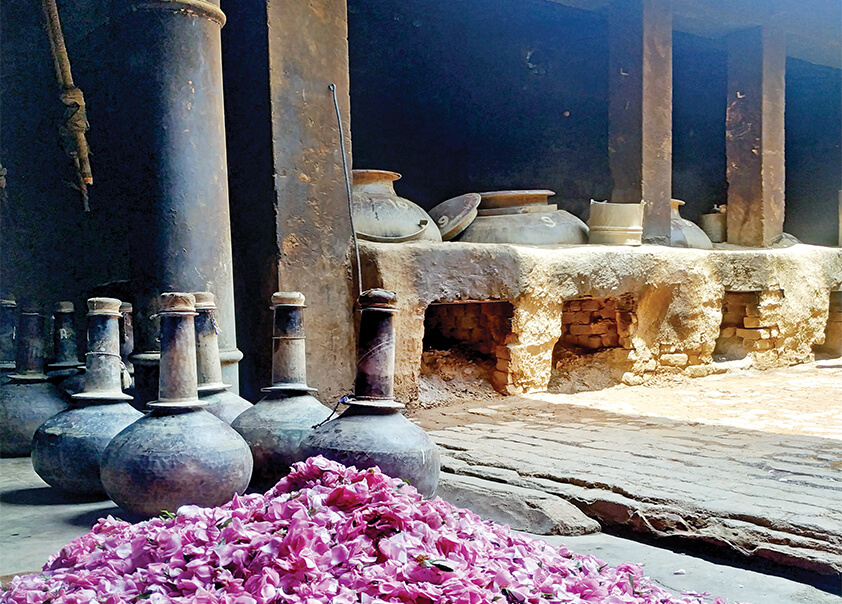
Expert navigation through Kannauj’s tight, crowded streets will bring you to 24 MG Road, a 120-year-old haveli that Chef Pranav Kapoor calls home. It is here, in a well-used kitchen on the first floor, where the 35-year-old’s professional artistry and family legacy come together to metamorphose into indelible dining experiences. Born to traditional perfumers – his is the eighth generation – Pranav is no stranger to fragrances. “I spent my school vacations interning at my grandfather’s factory, learning the ropes on the job. But I was always attracted to food and cooking and went on to study culinary arts at IHM – Aurangabad.” It was his stint there, he adds, that awakened him to the boundless potential of infusing fragrances with flavours.
“Fragrant food is not a novelty in Indian gastronomy,” says Pranav. He elaborates further, “Ancient epicureans were well aware of the important role olfaction plays in food preferences and intake. They often went to great lengths to arrive at the luxuriant meals they relished – cooking in aromatic leaves to irrigating vegetable patches with rose water to rubbing musk on fowls raised on saffron infused feed. They dined in camphor-scented rooms on food made with aromatic ingredients off perfumed tableware. Pure extracts and essence of flowers, herbs and spices were de rigueur for refined palates, especially under the Nawab of Awadhs. Even today, attar, kewra, and rosewater are extensively used in heirloom recipes in Lakhnawi homes.”
Long before sensory marketing –advertisements appealing to the five senses – became a byword, Tuscan restaurants were using strategically placed rosemary plants to prompt customers to linger and order additional food. Bakeries are known to flood the air with the aroma of freshly-baked bread or croissants, leading to impulse buys. “It’s a common ask in India as well,” shares Pranav, having developed several food-inspired scents for clients since he launched his gourmet perfumery brand, Indian Naturals. “Do you know Kannauj produces edible oils that smell like Basmati and chicken biryani? The biggest buyer is the food and beverage industry.”
Pranav is in the midst of finalising a five-course farm-to-bottle dinner menu for a client when we drive up. “I’ve envisaged it as a dining journey centred on unique fragrances and flavours of star ingredients. Each course takes inspiration from a stage in the perfume-making process.” He animatedly walks us through the stages and what the related course will feature in both taste and presentation. Soil: petrichor (known as gil or mitti attar) infused broths; Bloom: pâtés, sauces and mousse plated as flower blooms; Harvest: arancini representing crop-bearing burlap sacks; Distill: slow-cooked, scented haleem; and Blend: a multi-flavoured dessert. “I am promising a sensory adventure like no other, a symphony of taste and scent.” No kidding!
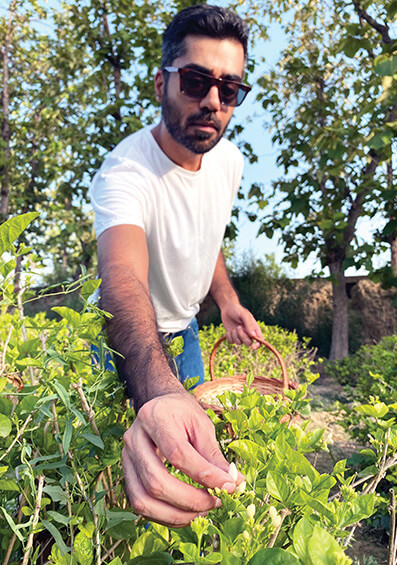
The perfumer-chef’s mixology innovations, which include edible oil cocktails, led him to gigs at popular bars and restaurants in Delhi and Bombay. “My gin-based drinks are an amalgamation of juices, spices and aromatic oils, and have been well-received. But the real star of the bar at 24 MG Road is my Petrichor Martini!” In addition to that, his passion for the art of fragrance and flavour has culminated in the creation of a gourmet mixology bar kit. “Crafting perfumes has taught me the delicate nuances of scent composition, allowing me to infuse cocktails with aromatic profiles. Simultaneously, my culinary background has provided me an understanding of the interplay of ingredients, enabling me to curate a selection of mixology sprays and oils.”
Following his internship with the Taj Group in Delhi and Bombay, Pranav forayed into the restaurant business for a few years, opening Hotbox, a 15-seat bar-cum-eatery in Malviya Nagar in 2011. A couple of years later, in 2013, he set up KT’s in Shah PurJat; named after his mother, the menu at Kunnu’s Tawa relied heavily on nostalgia. “The food at KT’s invoked emotional memories, most of the recipes were from my mother’s repertoire, and the menu listed several dishes I’d grown up eating.” 2013 was also the year Pranav launched Indian Naturals, offering signature scent marketing, hotel fragrance and flavour solutions to the retail sector.
“The pandemic put a spanner in the works for a bit, but it also allowed me to recalibrate future plans. The long spells at home helped rediscover my passion for creativity in the kitchen. The idea, to introduce discerning visitors to an immersive experience of Kannauj, and Khatri hospitality, took root during the lockdown. And here we are!” Pranav’s brilliantly-hued and atmospheric home boasts a perfume bar, a comfortable guest suite, and a red-walled dining room where guests can savour sit-down, multiple-course meals, all curated by the resident chef. The menu is driven by the fragrance of the season, which in turn, depends on the flower (rose or jasmine) being harvested and distilled at time of visit. Sample this: Tomato Rasam Smoked with Jasmine Petals, Jasmine Coconut Curry with Fresh River Fish; Rose Jam Canapes, Rose Sandesh.
A specially-curated Khatri Thali is another experience guests at 24 MG Road can look forward to. This delicious lesson in local cuisine, both aromatic and flavourful, is designed to showcase the symphony of spices and herbs that accord each dish a distinct palate profile. You can expect household favourites like Beetroot Curry (cumin), Amiya Sabzi (onion seeds), Lauki Yakhni (fennel), Aloo Dum (cardamom), Dhaniya Aloo (coriander and mint), Besan Bhindi (mango powder), and Saffron Paneer, accompanied by beetroot puri, aloo papad, preserved pickles (some 15 years old!), and tomato salsa.
“The cuisine of the Khatris, the community I belong to, is by and large vegetarian, prepared sans onions and garlic, and makes good on seasonal and farm fresh produce. The recipes, though seemingly simple to recreate, reveal many complexities to a professionally trained eye. Take our aloo papads, for instance, staple households busy themselves with making them soon as the fresh harvest arrives at the end of May. We use boiled instead of raw potatoes to prepare them; this ensures little to no oil is absorbed at the time of frying.” Pickles, chutneys and condiments are just as integral to Khatri kitchens and are all made at home; as are dry snacks like pattaur, mathri, seviyan, hing-coated mattar, and bhukni, a dry spice mix eaten with the mathri. Another popular staple is the poor ke samose, filled with yet another home-made dry masala. “More than me, it was my fellow boarders who excitedly looked forward to the mombatti-sealed plastic packets, bursting with goodies, which periodically arrived from home,” Pranav reminisces about his school days at Wynberg Allen, a premier residential school located in Mussoorie.
“Mango season also heralds frenetic activity in our homes, especially with the arrival of the Tikari variety, this is when we stock up on aam papad, pickle, and amchur. However, our much-loved amiya (unripe mango sabzi) is only made with the Dasheri aam,” Pranav exclaims. “As you can see, flavourful spices and aromats have always been an important component of our cuisine. That I would make the innovative jump, using aromatic oils and marrying Indian and Western ingredients to reimagine traditional recipes, was a natural progression. My recipe of Tagliatelle ala Karonda is a case in point.”
A skilled chef, knowledgeable perfumer, and an animated storyteller, Pranav desires to see Kannauj earn its rightful place as a leading fragrance centre of India, at par with similar centres around the world. Towards that end, he founded, and spearheads, the Perfume Tourism initiative in Uttar Pradesh and is simultaneously mapping a fragrance trail around India. “A highly anticipated fragrance and flavour-rich festival is in the offing in Kannauj. It promises to be a sensory symphony, where the world of fragrances intertwines with exquisite culinary delights, a delightful journey of scent and taste. Masterfully crafted spirits will be enhanced with fragrant botanicals, unlocking new dimensions of taste and aroma. Even as the allure of flowers sets you on a food and beverage tasting adventure, where each dish is thoughtfully centred on the essence of floral scents. This unique fusion of culinary art and perfumery will be a celebration of flavours and fragrances, redefining the notion of gastronomic indulgence.”
Note: All edible oils, sprays and fragrances mentioned above are in-house creations and blends.
